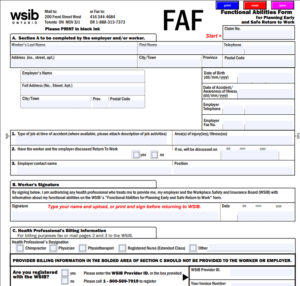Physiotherapy plays a pivotal role in injury recovery and disability management, offering tailored interventions that promote healing, restore function, and improve overall well-being.
By conducting thorough assessments, physiotherapists diagnose the nature and extent of injuries or disabilities, allowing them to design personalized treatment plans. Through a combination of pain management techniques, rehabilitative exercises, manual therapy, and the use of assistive devices, physiotherapy aims to alleviate pain, improve mobility, and enhance functional abilities.
Moreover, physiotherapists provide education, self-management strategies, and collaborate with other healthcare professionals to ensure comprehensive care.
With its holistic approach, physiotherapy empowers individuals to regain independence, maximize their potential, and lead fulfilling lives following an injury or in the presence of a disability.
Physiotherapy, also known as physical therapy, is a healthcare profession that focuses on promoting, restoring, and maintaining physical function and mobility in individuals.
It encompasses a wide range of interventions and techniques to improve the overall well-being of patients. The primary goal of physiotherapy is to enhance the quality of life by maximizing physical abilities and minimizing limitations caused by injury, illness, disability, or aging. It is based on a holistic approach that takes into consideration the individual’s unique needs, goals, and context.
Physiotherapists, or physical therapists, are highly trained healthcare professionals who specialize in the field of physiotherapy. They assess, diagnose, and treat various conditions affecting the musculoskeletal, neurological, respiratory, and cardiovascular systems.
Common techniques and interventions used in physiotherapy include exercise therapy, manual therapy, exercise therapy, electrotherapy, heat and cold therapy, hydrotherapy, assistive device recommendations, and education and advice.
Physiotherapy is commonly utilized in a wide range of settings, including hospitals, clinics, rehabilitation centers, sports facilities, and home care. It can be beneficial for various conditions, such as musculoskeletal injuries, neurological disorders, respiratory conditions, chronic pain, sports injuries, post-operative rehabilitation, and more.
Physiotherapy also plays a crucial role in injury recovery and disability management by addressing the specific needs of individuals and providing targeted interventions to facilitate healing, restore function, and improve overall well-being.
Assessment and Diagnosis
Physiotherapists conduct a comprehensive assessment to evaluate the nature and extent of the injury or disability.
They analyze the individual’s functional abilities, pain levels, range of motion, strength, and other relevant factors.
This helps in formulating an accurate diagnosis and designing a personalized treatment plan.
Pain Management
Physiotherapists use various techniques to alleviate pain, such as manual therapy, electrotherapy, heat and cold therapy, and therapeutic exercises.
They may employ hands-on techniques to reduce muscle tension, improve circulation, and release endorphins, which are natural pain-relieving substances.
Rehabilitation Exercises
Physiotherapists prescribe specific exercises tailored to the individual’s needs and goals.
These exercises aim to improve strength, flexibility, balance, coordination, and endurance. They help in restoring optimal function, promoting tissue healing, and preventing further injuries.
Progressive rehabilitation programs are designed to gradually increase the intensity and complexity of exercises as the individual progresses.
Manual Therapy
Physiotherapists use manual techniques such as joint mobilization, soft tissue massage, and manipulation to restore joint and tissue mobility, reduce stiffness, and improve function.
These hands-on techniques can help break down scar tissue, reduce muscle tightness, and improve circulation.
Assistive Devices and Aids
Physiotherapists may recommend and prescribe assistive devices like crutches, canes, walkers, or orthotic devices to support mobility, reduce pain, and improve independence.
They provide guidance on the proper use of these devices and ensure a proper fit for optimal function.
Education and Self-Management
Physiotherapists educate individuals about their condition, the healing process, and strategies for self-management.
They provide guidance on ergonomics, body mechanics, and proper movement patterns to prevent re-injury or further disability.
They also offer advice on lifestyle modifications, home exercises, and strategies for managing pain and reducing the risk of future injuries.
Functional Training and Return to Activity
For individuals recovering from injuries or disabilities, physiotherapists focus on restoring functional abilities required for daily activities, work, or sports.
They develop specific training programs to help individuals regain strength, coordination, and confidence in performing tasks, gradually progressing towards their desired level of activity.
Collaboration with Healthcare Team
Physiotherapists work collaboratively with other healthcare professionals, such as physicians, surgeons, occupational therapists, and rehabilitation specialists, to ensure comprehensive care and an integrated approach to injury recovery and disability management.
Summary
Physiotherapy aims to optimize the recovery process, minimize functional limitations, and enhance the individual’s quality of life following an injury or in the presence of a disability.
The specific interventions utilized will depend on the nature of the injury or disability, and the goals and needs of the individual. Physiotherapy plays a vital role in the comprehensive management of injuries and disabilities, offering a holistic approach that addresses the physical, functional, and emotional aspects of recovery.
By providing personalized assessments, targeted interventions, and ongoing support, physiotherapists empower individuals to overcome their limitations, regain optimal function, and improve their quality of life.
Through a combination of pain management techniques, rehabilitative exercises, manual therapy, and education, physiotherapy promotes healing, restores mobility, and enhances overall well-being.
With its multidimensional approach and collaboration with other healthcare professionals, physiotherapy serves as a guiding force in the journey of injury recovery and disability management, helping individuals realize their full potential and achieve a life of greater independence and vitality.
FAQs About The Role of Physiotherapy in Disability Management
Can physiotherapy help with neurological conditions?
Answer: Yes, physiotherapy can be beneficial for individuals with neurological conditions.
Physiotherapists specialize in assessing and treating neurological disorders such as stroke, multiple sclerosis, Parkinson’s disease, and spinal cord injuries.
They use techniques such as neurorehabilitation exercises, gait training, balance training, and functional retraining to improve mobility, coordination, and independence for individuals with neurological conditions.
Is physiotherapy suitable for chronic pain management?
Answer: Yes, physiotherapy can play a significant role in managing chronic pain.
Physiotherapists employ various techniques such as manual therapy, therapeutic exercises, electrotherapy, and education on pain management strategies.
They work closely with individuals to develop personalized treatment plans that address the underlying causes of pain and improve function, allowing individuals to better manage their pain and improve their quality of life.
How can physiotherapy help in post-operative rehabilitation?
Answer: Physiotherapy is crucial in post-operative rehabilitation to promote healing, restore function, and prevent complications.
Physiotherapists work closely with individuals after surgery to design tailored rehabilitation programs. These programs may include exercises to restore strength, range of motion, and flexibility, as well as pain management techniques, manual therapy, and guidance on activity modification.
Physiotherapy helps individuals recover safely and effectively, allowing them to regain their independence and return to their daily activities.
Can physiotherapy assist in managing respiratory conditions?
Answer: Yes, physiotherapy can be beneficial for individuals with respiratory conditions such as asthma, chronic obstructive pulmonary disease (COPD), and cystic fibrosis.
Physiotherapists use techniques such as breathing exercises, airway clearance techniques, chest physiotherapy, and aerobic conditioning to improve lung function, reduce symptoms, and enhance overall respiratory health.
They also provide education on self-management strategies and lifestyle modifications to help individuals better manage their respiratory conditions.
Is physiotherapy suitable for children with developmental disabilities?
Answer: Yes, physiotherapy is often used to support children with developmental disabilities.
Physiotherapists specializing in pediatric care work with children with conditions such as cerebral palsy, Down syndrome, and developmental delays. They focus on promoting optimal movement patterns, improving motor skills, enhancing balance and coordination, and facilitating independent mobility.
Through play-based activities, exercises, and parent education, physiotherapy helps children achieve their developmental milestones and improve their overall function and independence.






